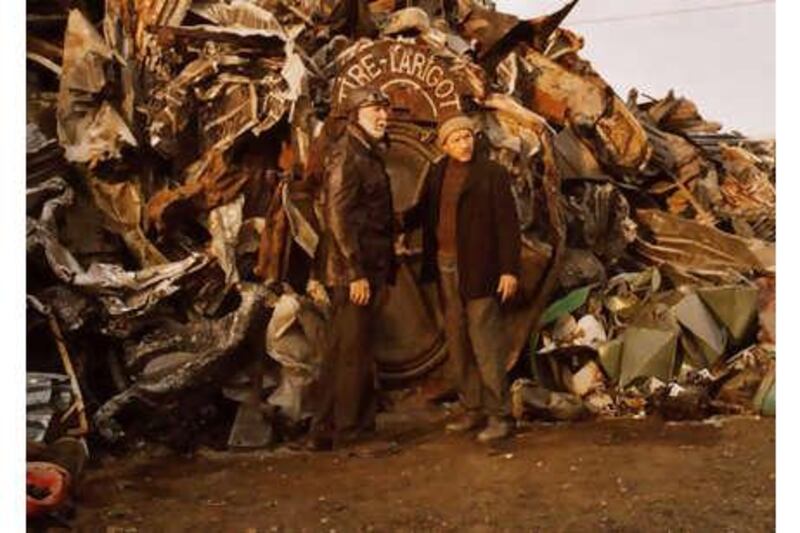Jean-Pierre Jeunet's office under the gaze of the Sacré-Coeur is as visually stunning as the images he puts on our cinema screens. The attention to detail, from the memorabilia in the glass cabinets to the positioning of chairs and desks, makes the room look like it's been put together for a magazine shoot. On the ground floor is his desk and computer and downstairs in the basement are shelves full of posters, books and DVDs from his own work. In the world of Jeunet, it seems, aesthetics are everything.
Looking around his office one feels that fantasy is possible and this sense of magical realism is what made his most famous film, Amélie, so remarkable. It's also apparent in his new film Micmacs, which is at its most intriguing when the action moves underground to a bunker housing a group of acrobatic urban guerrillas. The group of oddballs living underground include a human cannonball (Dominique Pinon), a contortionist (Julie Ferrier), an accounting whizz (Marie-Julie Baup), an ex-con (Jean-Pierre Marielle) and a motherly figurehead (Yolande Moreau).
These unlikely friends decide to help their latest recruit Bazin (Danny Boon) avenge the death of his father, who was killed by a landmine while serving overseas. Bazin himself has a bullet lodged in his head. So, out for revenge, Bazin and his cohorts want to destroy the arms businesses of both the manufacturer of the landmine and their rivals who manufactured the bullets. The plot is not the movie's strong point.
The idea for Micmacs has been brewing in the mind of Jeunet for a number of years. He says: "When I was making The City of Lost Children we were filming next to an office where they manufactured arms. The people who worked there, they were nice guys and yet at the same time they were going back to their office to build armaments." That's the tangible explanation. But it's the fantastical that always seems to drive the French director onwards. "I also wanted to talk about vengeance, arms sellers and Snow White and the Seven Dwarfs," he says, "I wanted it to be between cartoon and slapstick."
The 56-year-old director says that this emphasis on the make-believe is something that happened from a very young age. "The imagination was something that saved my life. I did not have an unhappy childhood, but I was an only child for a long time, which is weird. I would always be playing games or making games and so I was never alone. Today it's the same, I need to play all the time," he says. His interest in cinema came later, although he admits that he saw A Clockwork Orange 14 times as a youngster. He says his favourite film, and the one that changed his life, was Sergio Leone's Once Upon a Time in The West.
When he first moved to Paris at the age of 20,from his childhood home in Provence, he worked as a telephone installer and handyman. It doesn't seem a likely starting point for a career as a movie director but for Jeunet using his hands to bring to life what is in his mind is his life. "That's why I like doing films," he says. "I pass my time doing things and choosing things. Even the paper that one uses for storyboards is important; it's important to use the right type. The decoration in my office is all my doing, right down to choosing the furniture. I love to do things on my own."
After his arrival in Paris, Jeunet befriended Marc Caro and they began making moving images together, first making animated works before incorporating actors into their stories. They then made the celebrated short film The Bunker of the Last Shot. Despite its critical acclaim, it took almost another decade before they would make their magnificent feature film debut Delicatessen. Meanwhile, they struggled to find financing to make a film, and occupied themselves by making music videos instead.
Both of his first two films, Delicatessenand The City of Lost Children, were made with Caro as the co-director. He says of the partnership: "In the preparation I worked on the storyboard and he on the design by making the drawings look good. And on-set I worked more on the mise-en-scène and with the actors and he did the artistic direction "That was the separation and that worked really well for Delicatessen and it started to become a little bit more difficult when we made i>The City of Lost Children and I think that's because we are not brothers.
"If you look at cinema the people that work well together, they are always brothers. It worked for a film-and-a-half and then we had to explore our own wishes. And then for Alien: Resurrection, when they offered me the chance to go to Hollywood, I asked him if he wanted to work on costumes but Caro, he doesn't like the sun, so to go to LA would have been horrible." Jeunet admits that he simply could not resist the temptation of going to Hollywood, but Alien: Resurrection was a critical and box-office failure. He says: "The adventure was to do a Hollywood film. The interest was not in making the sequel; indeed cinema artists are those who work on a first film, like Ridley Scott.
"If it was the first time to do a Hollywood studio film then I would have agreed to make the Harry Potter sequel when they offered it to me, but apart from the experience there is no other reason to go." On the back of two weak films it seemed that his career had found a cul-de-sac. Then came Amélie, which Jeunet refers to as "the film of my life". He returned to Paris and wanted to make a movie that showed off the French capital in all of its glory. The personal attachment to the film also saw the director base the story of Amélie's childhood on his own upbringing.
The film would make an international star of Audrey Tautou and set Jeunet up for life. Yet it also became the standard by which Jeunet would be judged. He says: "Yes, it is, of course, hard to make a film after Amélie. It's hard. But at the same time it allowed me to have the budget to make A Very Long Engagement, which I also love. And thanks to the success of Amélie I can say that - and it's good because I don't make many films - it's going to make me have an easy life for the rest of my life. I'll always work. In Hollywood you always want to be making a film and in France all you need is a great success."
But that's not to say that Jeunet thinks it will be easy. He spent two years trying to adapt Yann Martel's award-winning book Life of Pi to the screen before the project was abandoned. But Jeunet says, the main reason the film didn't work wasn't the exploding budget but because: "No one realised it would be impossible to put a boy, a tiger and a sea together." So, as he did after Alien: Resurrection didn't work out the way he wanted, Jeunet embarked on a more personal project, and one set in Paris.
Now that Micmacs has been completed, Jeunet admits that he wants his next film to be an adaptation of a novel, something grand. For Jeunet is always happiest when he can let his imagination run wild.






